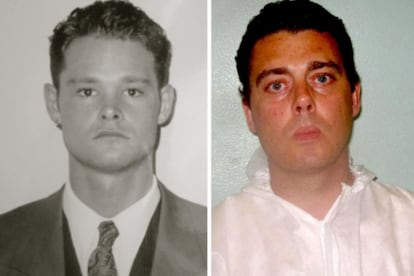Supreme Court finds Dutchman innocent of rape after spending 12 years in prison
Despite DNA evidence presented in 2007 linking another suspect, judicial bureaucracy held up his case


A Dutchman who has spent more than 12 years in prison for a rape that was committed by another person was ordered released from custody on Wednesday after he was acquitted on appeal by the Spanish Supreme Court.
Romano Liberto van der Dussen was convicted of three sexual assault cases that took place in August 2003 in Málaga.
In 2007, Spanish police found that the DNA evidence in at least one of the cases didn’t link Van der Dussen to the crimes committed, but instead matched the genetic makeup of British national Mark Dixie, who is currently serving jail time in Britain for rape and murder.
Despite the new findings, Van der Dussen spent nine more years in jail because of the snail-paced Spanish justice system
Despite the new findings, Van der Dussen spent nine more years in jail because of the snail-paced Spanish justice system and the bureaucracy involved in the cooperation between Spain and Britain in the case.
The court’s ruling handed down by Justices Manuel Marchena, Andrés Martínez Arrieta and Joaquín Giménez only acquits him in the rape case, where DNA was tested; there were no samples in the other two attempted rapes.
The Málaga regional High Court, however, ruled during Van der Dussen’s conviction that the suspect in the three cases had to be the same man because the incidents were similar and had taken place on nearby streets between 4.30am and 6am on August 10, 2003 in Fuengirola
In all three cases, the attacker approached the victim, violently beat her and then tried to rape her. Every time, a passerby or a car interrupted the attack before the victim was raped, but all three women – ages 19, 29 and 33 – were left terrified by their ordeals.
Van der Dussen, who is now 43, will be released from prison because he has served his time, but under the eyes of the Spanish justice system he is still guilty of the other two sexual assaults.
His defense lawyer, who had asked for a full acquittal, is satisfied that Van der Dussen will soon be released.
Van der Dussen, now 43, will be released but under the eyes of the law he is still guilty of two sexual assaults
In an EL PAÍS interview last year, Van der Dussen said he couldn’t understand why it has taken so long to exonerate him when the police had evidence pointing to Dixie since 2007.
“I’ve been in jail over 11 years for crimes I did not commit. I have been through an indescribable hell, these have been the worst 4,000 days of my life,” he said.
“During this time I have seen people get stabbed, others commit suicide, others get raped over unpaid debts... All this has caused me irreparable damage. I am in psychiatric treatment. I take medication for post-traumatic stress and suffer from multiple psychological disorders. I have even lost my own dignity as a person. How can I believe in the justice system?”
The 15-year sentence handed down by the Málaga High Court was based exclusively on the testimonies of the victims – filled with irregularities – who had identified him from a photo lineup. The court had overlooked the DNA evidence, which would have exonerated him.
With the help of the International Police (Interpol) database, Spanish police matched the DNA in 2007 to Mark Dixie, a British man who had confessed to murder and rape and in custody since the previous year.
A police forensic report dated March 23, 2007, and presented to the court, concluded that there was 54 million times more likely that the DNA sample was a mix of the genetic makeup of Dixie and his Fuengirola victim, rather than two other people by chance.
Nevertheless, the court asked for more genetic markers from Dixie through British authorities – proceedings that would take another nine years to complete.
The Málaga High Court and the judge charged with reviewing the case never received any findings from the international judicial commission sent to Britain because procedures were not followed properly. The case was later dismissed.
“It is unbelievable that this man has spent all this time in prison for crimes he did not commit”
It wasn’t until four years after that first DNA finding that Van der Dussen’s lawyer, Silverio García Sierra, filed his appeal with the Supreme Court along with the evidence.
But it took three years for British authorities to comply with a petition by the Spanish Supreme Court for a new genetic profile of Dixie.
When the results came back in February 2015 that concluded it was Dixie who raped the woman in Fuengirola, Spanish police spent months drafting a new report based on the recent findings by British authorities.
Throughout this time, Van der Dussen remained in prison.
“This is an incredible example of slowness, apathy, negligence and bad professional practice by all the judicial authorities who were involved,” said García Sierra. “It is unbelievable that this man has spent all this time in prison for crimes he did not commit.”
English version by Martin Delfín.
Tu suscripción se está usando en otro dispositivo
¿Quieres añadir otro usuario a tu suscripción?
Si continúas leyendo en este dispositivo, no se podrá leer en el otro.
FlechaTu suscripción se está usando en otro dispositivo y solo puedes acceder a EL PAÍS desde un dispositivo a la vez.
Si quieres compartir tu cuenta, cambia tu suscripción a la modalidad Premium, así podrás añadir otro usuario. Cada uno accederá con su propia cuenta de email, lo que os permitirá personalizar vuestra experiencia en EL PAÍS.
¿Tienes una suscripción de empresa? Accede aquí para contratar más cuentas.
En el caso de no saber quién está usando tu cuenta, te recomendamos cambiar tu contraseña aquí.
Si decides continuar compartiendo tu cuenta, este mensaje se mostrará en tu dispositivo y en el de la otra persona que está usando tu cuenta de forma indefinida, afectando a tu experiencia de lectura. Puedes consultar aquí los términos y condiciones de la suscripción digital.








































